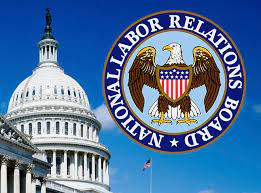The Significance of the National Labor Relations Board Unfair Labor Practice Process

The National Labor Relations Board (NLRB) Unfair Labor Practice (ULP) process plays a vital role in protecting workers’ rights and promoting fair labor practices in the United States. This process addresses allegations of unfair labor practices committed by employers or unions, safeguarding both party’s rights and interests. In this essay, we will probe into the value of the National Labor Relations Board ULP process and compare it with processes in non-union environments. Furthermore, we will engage with the viewpoints of two classmates to foster a comprehensive discussion.
Value of the National Labor Relations Board Unfair Labor Practice Process:
The National Labor Relations Board ULP process is paramount for maintaining a balanced and harmonious relationship between employers and employees. One of its primary values is the ability to provide a formal avenue for resolving disputes related to unfair labor practices. This process empowers workers by permitting them to voice their concerns without fear of retaliation, ensuring their right to engage in concerted activities for mutual aid and protection, as granted by the National Labor Relations Act National Labor Relations Board. Furthermore, the National Labor Relations Board ULP process acts as a deterrent against potential unfair labor practices, encouraging employers and unions to adhere to the stipulations of the NLRA.
The process also fosters transparency and accountability. Employers or unions accused of unfair labor practices must engage in the process and present their side of the story, leading to a more comprehensive understanding of the situation. The NLRB, as an impartial entity, examines the evidence and determines whether unfair labor practices have indeed occurred. This emphasis on due process ensures that decisions are based on evidence and established legal standards, enhancing the credibility of the process.
Additionally, the NLRB ULP process contributes to developing labor law jurisprudence. The NLRB interprets and applies labor laws through the cases it handles, setting precedents that guide future interactions between employers and unions. This iterative process helps refine the understanding of labor rights and responsibilities, contributing to labor laws’ evolution and adaptability to changing workplace dynamics.
Comparison to Processes in Non-Union Environments:
The NLRB ULP process differs significantly from non-union environments, primarily due to the absence of collective bargaining and labor unions. In non-unionized settings, employees generally need more organized representation than unions provide. As a result, disputes are often addressed individually, and the power dynamics between employers and employees may be more skewed. While the legal framework protects individual employees from unfair treatment, the absence of collective bargaining can limit workers’ bargaining power.
In non-union environments, alternative processes such as internal grievance procedures or third-party mediation may be employed to address workplace disputes. These processes, however, might need more legal backing and enforcement mechanisms than the National Labor Relations Board ULP process offers. Additionally, employees in non-unionized settings might fear retaliation for speaking out against unfair labor practices, potentially deterring them from pursuing their claims.
Classmate Interaction:
Classmate 1: Emma
Emma: The NLRB ULP process seems like a powerful tool to protect workers’ rights. I wonder how effective it is in practice. Are there any challenges or limitations that might hinder its impact?
Response:
Unquestionably, Emma, you raise an important point. While the NLRB ULP process has notable advantages, it has some challenges. One significant challenge is the time it takes to resolve cases. Legal proceedings can be lengthy, and dispute resolution delays might undermine the intended swift protection of workers’ rights. Additionally, enforcement mechanisms can be limited. Even if the NLRB finds an employer or union guilty of unfair labor practices, enforcing remedies and penalties might be challenging, potentially reducing the process’s deterrent effect. Nonetheless, the process still raises awareness about labor rights and promotes workplace fair practices.
Classmate 2: Alex
Alex: It’s interesting how the NLRB ULP process focuses on collective rights through unions. But what about workers who don’t want to be part of a union? How are their rights protected?
Response:
You’re right, Alex. The NLRB ULP process primarily addresses issues related to collective rights and unionized environments. Nevertheless, workers who choose not to be part of a union still enjoy protection under labor laws, including the NLRA. These laws safeguard individual employees from unfair labor practices, even if they’re not part of a union. In non-union settings, though, the lack of organized representation might make it more challenging for individual workers to navigate the process and assert their rights, especially if they fear backlash from their employers.
In conclusion, the National Labor Relations Board ULP process is critical for ensuring fair labor practices and protecting workers’ rights in unionized environments. It offers a formal and impartial avenue for resolving disputes and upholding the principles of the NLRA. While challenges exist, its value in promoting transparent, accountable, and balanced employer-employee relations remains undeniable. In non-union environments, the absence of collective bargaining and organized representation underscores the importance of alternative mechanisms to address unfair labor practices and protect individual workers’ rights.
References
www.nlrb.gov. (n.d.). Introduction to the NLRB | National Labor Relations Board. [online] Available at: https://www.nlrb.gov/about-nlrb/what-we-do/introduction-to-the-nlrb.
www.nlrb.gov. (n.d.). The NLRB Process | National Labor Relations Board. [online] Available at: https://www.nlrb.gov/resources/nlrb-process.





